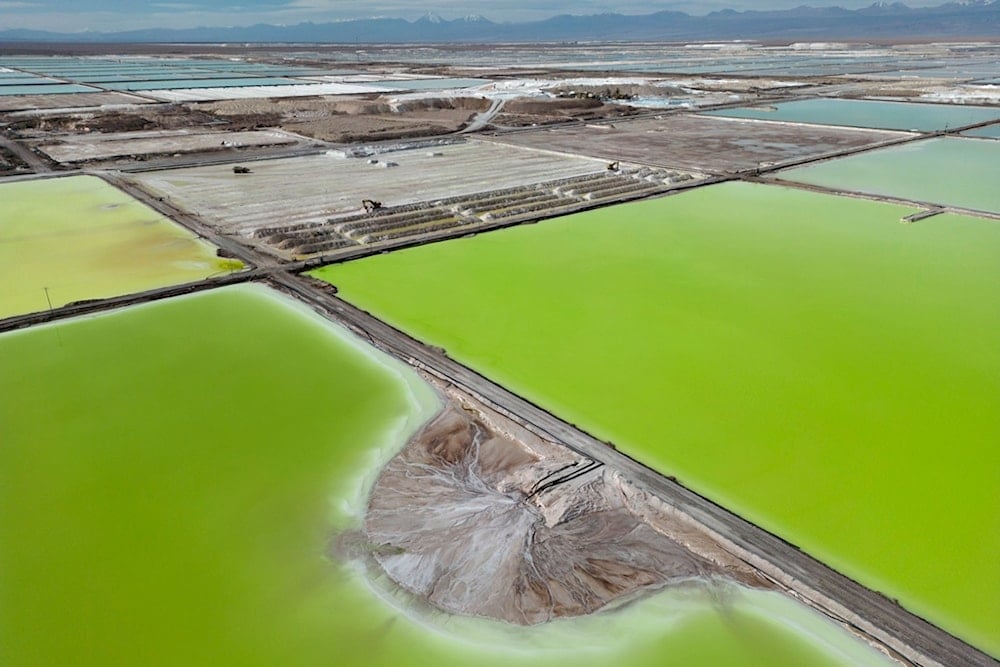Trump's rare earth push ignites global investor frenzy: FT
The United States' push to break China's dominance in rare earths and critical minerals has ignited investor enthusiasm, sweeping trade retaliation, and a deeper geopolitical clash.
-

Brine evaporates in pools at the lithium extraction plant facilities of the SQM Lithium company near Peine, Chile, April 18, 2023 (AP)
Investors are pouring capital into rare earth and critical mineral stocks as Donald Trump's administration accelerates efforts to challenge China's dominance over the sector, the Financial Times reported on Monday. The White House's aggressive push to secure alternative supply chains has turned a once-overlooked industry into a market phenomenon.
Washington is fast-tracking mining permits, easing environmental rules, and creating a strategic reserve under its "mine, baby, mine" policy. It also plans to introduce a price floor to stabilize the volatile market, which is heavily influenced by China's state-owned producers. The administration has taken equity stakes in several companies, including $400 million for a 15 percent stake in MP Materials, and smaller holdings in Canada's Lithium Americas and Trilogy Metals, both of which saw their share prices soar following the investments.
Beijing intensified the rivalry this month by tightening export controls, requiring approval for magnets containing Chinese rare earths and adding five more elements, holmium, erbium, thulium, europium, and ytterbium, to its restricted list. "There's across-the-board interest from investors in these mining companies," said Timothy Puko of Eurasia Group. "There aren't many publicly traded Western companies to invest in. Very few targets and a whole lot of shooters in the market right now," he added.
The surge has lifted stocks of MP Materials, USA Rare Earth, and Australia's Lynas, all of which have more than doubled this year. Companies such as Standard Lithium and Critical Metals have capitalized on the optimism by raising new funds, $130 million and $50 million, respectively, to expand their operations.
Market frenzy could invite speculation
Some analysts warn that the market frenzy could invite speculation. "Various rare-earth junior-mining companies have been milking the situation… with their share prices benefiting from the apparent reaction to the export controls," said Gareth Hatch of Strategic Materials Advisory. "While I would not characterise the situation as a bubble just yet, investors must do their homework," he added.
Others question government intervention. Defense Metals' executive chair Guy de Selliers argued that "abstract" price floors are "dangerous," favoring stockpiling instead. Still, analysts like David Merriman at Project Blue note that established producers such as Lynas and MP will likely "fill the gap" left by China's tightening export regime.
Still, the political confrontation driving the market rally shows no sign of easing.
Tariffs, tech, tensions
The confrontation over rare earths is unfolding alongside a broader trade escalation. In mid-October, President Trump imposed 100 percent tariffs on a new wave of Chinese goods, calling the move "not sustainable" but insisting that "they forced me to do that." The decision, which followed Beijing's latest export restrictions, reflects Washington's determination to counter what it views as China's "economic coercion," even at the risk of inflaming market volatility and driving up costs at home.
China, for its part, has argued that the United States is weaponizing trade and technology for geopolitical gain rather than legitimate economic competition. Officials in Beijing describe Washington's tariffs, export controls, and investment restrictions as acts of "economic coercion". They argue these measures aim to contain China's rise in high-tech manufacturing and green energy.
The Chinese Ministry of Commerce defended its own rare-earth export controls as "necessary measures" to ensure national security and prevent sensitive materials from being used against China's interests, insisting that such policies are in line with international norms. State media have also accused Washington of "double standards", noting that the US maintains sweeping restrictions on advanced semiconductor exports while criticizing Beijing for regulating its critical minerals sector.
In public statements, Chinese analysts have framed the standoff as part of a long-term struggle over industrial sovereignty, stressing that Beijing seeks a "balanced and reciprocal" relationship rather than unilateral concessions. Analysts warn, however, that US pressure is accelerating China's drive for technological self-reliance and deeper ties with emerging economies across Asia, Africa, and the Global South.
Read more: US, China to resume trade talks in Malaysia to avert tariff war

 4 Min Read
4 Min Read








